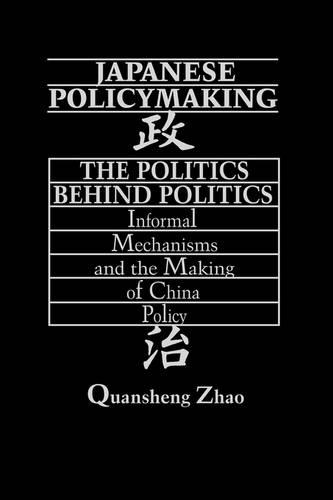
Japanese Policymaking: The Politics Behind Politics Informal Mechanisms and the Making of China Policy
(Hardback)
Publishing Details
Japanese Policymaking: The Politics Behind Politics Informal Mechanisms and the Making of China Policy
By (Author) Quansheng Zhao
Bloomsbury Publishing PLC
Praeger Publishers Inc
22nd February 1993
United States
Classifications
Tertiary Education
Non Fiction
International relations
320.952
Physical Properties
Hardback
256
Description
Japan's policymaking is, given that nation's economic prowess and history, of considerable interest. Quansheng Zhao aims to make a contribution to an improved understanding of Japanese policymaking processes by examining several informal approaches of mechanisms, which in their interrelationships directly affect policy formulation. He examines "kuromaku" or the informal organisations or political actors; "isuskiai" or social connections; and "nemawashi" or the behind-the-scenes preparations, and shows their effect on policy through detailed empirical analysis. Four case studies involving Japan's policies toward China offer special insights into Sino-Japanese relations and provide lessons concerning the country's international policies. The treatment of political institutions, social environments and political cultures should provide the required understanding of essential elements affecting the stance Japan takes vis-a-vis other countries.
Reviews
"[This book] concentrates upon precisely those aspects of the Japanese decision-making structure that have often been neglected by scholars and have never been so thoroughly explored as in this study. . . . Another strength of the [volume] is the familiarity shown by the author with both the theoretical and empirical literature pertaining to his subject. He delineates the arguments and weighs in with his own views in a comprehensive and balanced manner."-Robert A. Scalapino Institute of East Asian Studies University of California
.,."a fount of information on how Japan's inner circle has coped with China and how the Chinese have played some astute cards when dealing with successive Japanese governments and men from the ministries..."-Far Eastern Economic Review
.,."adds much in substance to the existing literature on Japanese policymaking and makes a significant contribution to the general understanding of Sino-Japanese relations. This book deserves to be widely read."-The International History Review
...a fount of information on how Japan's inner circle has coped with China and how the Chinese have played some astute cards when dealing with successive Japanese governments and men from the ministries...-Far Eastern Economic Review
...adds much in substance to the existing literature on Japanese policymaking and makes a significant contribution to the general understanding of Sino-Japanese relations. This book deserves to be widely read.-The International History Review
With this book, Quansheng Zhao has made a welcome contribution to the growing body of literature on the Japanese communication and decision-making processes. Emphasizing empirical analysis'' in the making of China policy, Zhao concentrates his study on the informal Japanese policymaking mechanisms a strong, informative, and meticulously researched book that is well worth a look.-Journal of Asian Studies
Zhao has done a good job of educating us as to the fine points of Japanese consensus-building processes. His lengthy bibliography provides a fine research tool for further study of Japanese foreign policy-making.-The Annals of the American Academy
Zhao's work makes a major contribution to the field, and should be welcomed by graduate and undergraduate students.-Choice
..."a fount of information on how Japan's inner circle has coped with China and how the Chinese have played some astute cards when dealing with successive Japanese governments and men from the ministries..."-Far Eastern Economic Review
..."adds much in substance to the existing literature on Japanese policymaking and makes a significant contribution to the general understanding of Sino-Japanese relations. This book deserves to be widely read."-The International History Review
"Zhao has done a good job of educating us as to the fine points of Japanese consensus-building processes. His lengthy bibliography provides a fine research tool for further study of Japanese foreign policy-making."-The Annals of the American Academy
"Zhao's work makes a major contribution to the field, and should be welcomed by graduate and undergraduate students."-Choice
"With this book, Quansheng Zhao has made a welcome contribution to the growing body of literature on the Japanese communication and decision-making processes. Emphasizing empirical analysis'' in the making of China policy, Zhao concentrates his study on the informal Japanese policymaking mechanisms a strong, informative, and meticulously researched book that is well worth a look."-Journal of Asian Studies
Author Bio
QUANSHENG ZHAO is Director of the Institute of Asian Studies, Chairman of the Asian Studies Committee, and faculty member in political science at Old Dominion University. He is co-editor of Politics of Divided Nations: China, Korea, Germany, and Vietnam (1991) and has authored articles published in Asian Survey, Asian Profile, The Annals of the AAPSS, Journal of Northeast Asian Studies, The Pacific Review, and World Outlook.
